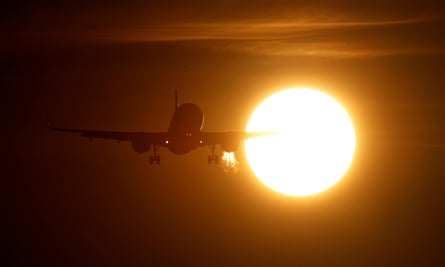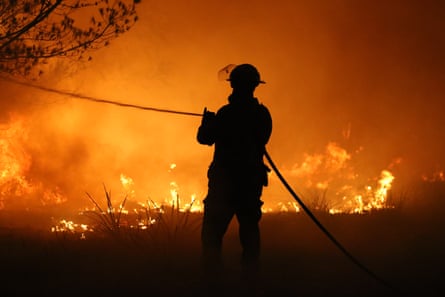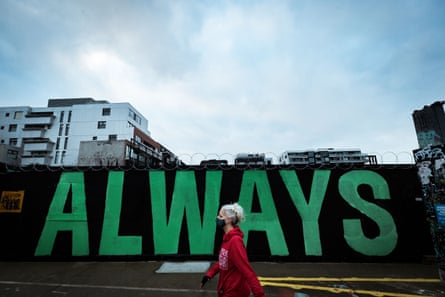As soon as my partner and I completed two weeks’ quarantine after returning from Europe in late March, I went around to visit my mother. We had talked on the phone every day throughout the lockdown, and twice during our quarantine she had defied the warnings against elderly citizens leaving their homes to drive to our place and deliver food parcels.
There are images of the pandemic that will forever be part of our cultural memory: the long lines at Centrelink after thousands of Australians lost their jobs; the furious scrambling for goods in the supermarkets; and the desperate faces at the windows of those poor souls in Melbourne’s public estate towers who were sent into cruel and immediate detention when the city lurched haphazardly into a second lockdown.
But every single one of us will have a unique memory that will define the staggering dislocation that we all experienced in 2020. For me, it is my mother standing outside our house. I am at the window, waving at her and mouthing “thank you” for the food. And she is weeping. She so wants to embrace and welcome home her child. Covid-19 still makes that impossible.
Negotiations and calculated risks: they become second nature over the period of the pandemic. My mother is 82 years old and the health advice is that she should stay at home. My brother and I argued with her on the phone, explaining that the protocols are for her own good, that her demographic is most at risk. She has read and listened to the advice in the Greek-language media but she decided to continue driving and to do her own shopping while maintaining the rigours of social distancing and sanitation. After my third attempt to convince her to stay home, she snapped at me.
“I refuse to be a prisoner. Let the Lord take me if He wants. I need to breathe!”
She pleaded with me to visit when I was free from quarantine. I drove over to her house and we sat at opposite ends of her kitchen table. At one point, as we were deep in discussion, she leaned forward and I gauged that it was her instinct to touch my hand. I sprang back in my seat, knocking the chair against the wall.
“My Lord,” she exclaimed, hugging herself tight as if to rein in the humanity of her impulses, “I’ve lived through hunger and occupation and civil war but even in the worst of times we were allowed to touch, we were allowed to hug each other.”
And then, quickly, she crossed herself.
“We’re lucky,” she said. “We’re not ill and we’re not homeless. Let’s be thankful for that.”
That afternoon she asked me about being in the UK as the whole world stumbled punch-drunk into lockdown. I tried to describe the astonishing disorientation we experienced while navigating the crowds at Heathrow, Dubai and Melbourne airports. For the first time in my life I was disturbed by the cavalier assumption so many of us had that there was nothing extraordinary in assuming the right to air travel. We were women and men. We were young and old. We were black and brown and Asian and white. And we were from across the globe. Why were we all taking this miracle of flight for granted?
I made her laugh when I described the young woman sitting next to me at the back of the economy section. That woman was cheerful and loquacious, but from time to time was wracked by a terrible cough, and she would huddle herself into a ball to make sure she coughed into her armpit. At one point, seeing her distress and her guilt, I tapped her on the shoulder and pointed around the crammed cabin: people in line waiting for the toilets, a mother nursing her crying child, the harried stewards trying to navigate the meal trolleys in the narrow aisles that made nonsense of the pilot’s takeoff pleas for maintaining social distancing.
“It’s OK, if there’s Covid on this flight, we’re all going to get it.”
My mother and I both laughed.
“Who knows when I will fly again?”
My mother shrugged at my question, and then, turning, she pointed to the myriad postcards Blu-Tacked on the kitchen cupboard doors that I had sent her over the years. India and Mexico, Turkey and Jordan and Spain, New York and Tokyo and Paris.

“You’ve travelled enough.”
It wasn’t an admonishment; it was a simple statement of fact.
My father, who migrated on a ship to Australia in 1955, returned twice to his homeland in Greece. The first time was in the early 1970s to farewell his father who was dying, and the second time was in the early 1990s to bury his mother. It is only recently that I realised the immense financial cost of that first trip back home. My parents were saving up for a new house but, when he received the call that his father was ill, they sat down together and made the decision that it was his duty to return home. Everything else would have to wait. At that point, air travel was a luxury and even though my father organised the cheapest flight possible, one that took him from Melbourne to Manila and from Manila to Karachi and then to Athens, my mother’s recollection was that it still ended up costing $2,000. In 1972, that money would have been a sizeable deposit on a house. It was not conceivable that we could go as a family. My parents were labourers in inner-city factories. The costs would have been prohibitive.
In the nearly 50 years that my parents were married, they never flew on a holiday together. I looked at the postcards in my mother’s kitchen, those pretty vistas of Europe and Asia and the Americas, and I felt shame.
For most Australians, two events will clearly define 2020, and they are events imbued with an atavistic, biblical solemnity: fire and plague. The new year began with the catastrophic fires that destroyed lives, communities, towns and forests all down the eastern seaboard of Australia. Yet, amid the distress and mourning, the evaluation and the taking stock, I found myself hopeful. I travelled up to the New South Wales south coast and was humbled by seeing a large group of firefighters emerge from a smouldering forest, their faces scorched by the detritus. They were heroic and they were noble, and I didn’t give a damn whether they individually voted Labor or Coalition, Shooters party or Greens. And there were so many people wanting to contribute money, assistance and resources to those most affected by the fires. These expressions of unity and goodwill, of compassion and sorrow, seemed to cut across the ugliness of partisanship and hectoring outrage that has defined our politics for so long. It even seemed possible that, after a decade of political bickering and inertia, we would finally as a nation take definitive steps to address climate change.
When I reflect on that time in January – only a few months ago, but the subsequent arrival of the Covid-19 pandemic makes it seem like another age – I realise that my optimism was naive. The idiocies of rightwing culture wars and the equal absurdity of leftwing identity politics soon re-emerged to clog the sewerage that is social media. Nevertheless, there was something undeniably sobering for all of us in acknowledging the terror caused by the fires. We had to contemplate tragedy. There are many Australians who have known tragedy already: generations of refugees and migrants who fled wars and dictatorships to create new lives in this country; and the First Australians, engaged in the too-long struggle to unshackle themselves from the bondage of dispossession. There is individual tragedy, too, of course: the loss of a child or the loss of a partner. But it has been a long time since we have faced tragedy collectively.
The fire and the plague are a call and response, a motif I borrow from music, but which seems to me appropriate for this time. The bushfires of last summer and the pandemic of this present moment are two distinct phenomena. Yet they have occurred in a specific moment in time when accelerating globalisation has undermined the centuries-old legitimacy of the nation-state. These historic forces have bound together the fires and the pandemic. But the fire and the plague have disrupted the exultant progress of globalisation.

Most of us understand that combating climate change requires an international response. The severity of the fires also made us understand that a continent such as Australia will face unique challenges from a warming climate. And if you were stuck in an airport in mid-March, as the immensity of the Covid-19 crisis dawned on the whole of the world, as you tried desperately to plead for a ticket on a flight back home, you would have realised that no other element to your identity was as important as the stamp on your passport. I was in Europe but my Greek heritage mattered naught. Borders were slamming shut at breathless speed. Fuck off back to where you came from. The messaging was as succinct and as clear as that.
The shame I experienced looking at the postcards I sent my parents was ignited on that wretched return flight home from Dubai to Melbourne. Looking around at that overcrowded cabin, I recognised that, for all my smug self-belief that I was on the winning side of history when it came to climate change, the many flights that I have taken over the last few decades – from Melbourne to the world, from Melbourne to Sydney, to Brisbane, to Alice Springs, to Perth – have contributed so much more to carbon emissions than if I had been living in an air-conditioned McMansion at the outer suburban edge of my city. Call and response. One voice declares, “I am righteous and cosmopolitan and a compassionate citizen of the world.” The other voice rises and asks, “Who the hell are you to throw the first stone?”
There is a cohort of my friends – people I love and adore, with whom I have partied and worked and cried – who sometimes lament my allegiance to family. Strongly feminist and proudly progressive, they are suspicious that my respect for family tilts me towards conservatism. They are probably right. The last few months I have been describing myself as a conservative socialist, wary of the moral shapeshifting required from contemporary progressivism. The importance of family for me clearly has to do with the symbolic and material consequences of my parents’ migrations. In leaving their country at a time of war and poverty, in forging a new life in a new country in which they did not speak the language and which was on the other side of the earth, my mother and my father endured hardships that are inconceivable to a soft generation like my own. Their call is sacrifice. My response has to be gratitude.
But it isn’t only about migration. It also has to do with class. My father’s knees were destroyed by the long years on assembly lines, as were my mother’s wrists. Soon after coming out of quarantine I caught up with an elder distant relative. She has spent her life here in Australia, working in factories and in retail and as a cleaner, and though she admits that she never reads – the literary world is another planet for her – she has always expressed pride in my being a writer. Seeing her again, we spoke of the fires and we spoke of the pandemic. She’s never asked anything of me. But she did this time. We spoke of what the world was like before Covid-19 and she sighed and said, “It’s hard. There’s no security in the work my children do, everything is too expensive, and there’s no faith in politics.” We both lamented the pace of globalisation. And then, shrugging, I said, only rhetorically, “What can any of us do?”
That’s when she said, “There’s nothing I can do, Christo. But you’re a writer and you have a voice. Tell them how hard globalisation is for us. Tell them we need industries and jobs in this country. Tell them we need a future and tell them we need dignity.”
Her call.
My response?

A few weeks ago, before Melbourne went into a second lockdown, I dared to catch a tram again. I had my hand sanitiser in my jacket pocket, I made sure to wear gloves. Behind me were three young women, VCE students from the inner-city high school down the road. They started discussing the Black Lives Matter rally they had all attended the week before. My ears pricked up. For one brief moment, I had contemplated going to the protest. If I’m truly honest, not for the murder of George Floyd. That murder was sickening and wretched and unjust; but it happened in the US and if this pandemic has taught me anything it is that, contrary to a belief that I myself have espoused in the past, we are not the US. Thankfully, we are not the US. But the unconscionable rate of incarceration of Indigenous people and the continuing blight of Aboriginal deaths in custody gave the rallies in Australia a clear moral purpose. However, I knew that if I did attend, I would immediately choose to return to a fortnight’s quarantine. Given my responsibilities to my mother, and given that my partner’s mother is also elderly, I decided against going. The young students were passionate about anti-racism, and they dropped the word “privilege” a few times. But very soon their conversation turned to how Covid-19 had ruined their plans for schoolies week. They had been planning to fly up to Byron Bay but that now seemed impossible. “It’s so unfair,” one of them sighed.
Did I speak up? Of course I didn’t. I remember being young. But I thought of the many gifts my parents had given me: the gifts of patience, of compassion, of sacrifice. I realise now that one of the greatest gifts I received from them is the gift of gratefulness. My mother crosses herself and declares, “We’re not ill and we’re not homeless. Let’s be thankful for that.” It was in the interplay between gratitude and the responsibilities that ensue from that understanding that my ethics and my politics were formed. That gift is my bedrock.
I recall the faces of the weary, dirty firefighters emerging from the scorched bush at the start of this calamitous year. I remember the chaos at the airports in March and my dawning realisation that our reckless indulgence in travel might be over. I think of that pretty row of postcards.
So, my response to this year of plague and of fire is to offer you the gifts my parents gave me: now is the time for patience, for compassion, for gratitude. Now is the time for sacrifice.
o This essay will be part of the anthology Fire, Flood and Plague, edited by Sophie Cunningham and published by Penguin Random House in December